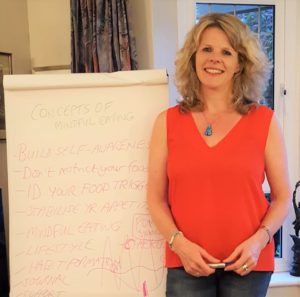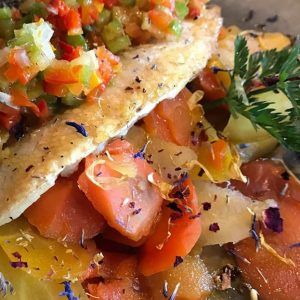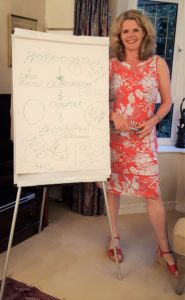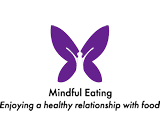
Emma Randall
Mindful Eating Workshops: Improve Your Eating Habits & Relationship With Food
(Via Zoom Or In Person, Surrey-Based).
“I was very impressed by Emma’s in-depth understanding of emotional eating issues. Emma had some sound advice for us all and it was tailored to our own unique circumstances. Emma’s obvious understanding of nutrition plus the psychology of overeating made the talk very informative and interesting.”
Since 2008 I’ve been giving talks and running groups to people of all ages at a range of organisations, corporate companies, schools, colleges, senior citizen groups, drop-in centres and depression support groups. I’ve worked as a trainer at a weight loss company, creating and delivering nutrition modules to weight loss consultants. My talks are normally 90 minutes (including time for Q&A), but I can also run half or full day workshops or group sessions for organisations on request. All of my talks can be in-person or online. Please scroll down to read summaries of all my various talk topics, and for more information on employee-wellness sessions for organisations.
 My talks are beneficial for anyone who:-
My talks are beneficial for anyone who:-
~ Overeats, binge eats, secret eats, grazes, and might struggle to control their weight
~ Would describe themselves as an emotional eater, comfort eater, or has struggled long-term with disordered eating
~ Tends to eat mindlessly and on ‘autopilot’
~ Is a yo-yo dieter
~ Is looking for some help to improve their relationship with food
~ Is interested in learning about the physiology (food, appetite and the body, and nutrition for mental health/brain function and weight management).
‘How To Eat Normally And Lose Weight Without Dieting’
‘The Hormone Factor: Understanding & Tackling Obesity’
 When it comes to weight management, thinking about calorie intake simply isn’t enough- we also need to consider the ‘metabolics’- this means looking at a range of key hormones that are involved in appetite, satiety, the processing of glucose from food, fat storage and fat burning, and the body’s stress response. What we eat, as well as our attitude, personality and lifestyle (busyness and stress levels) all have a powerful influence on our physiology (the body’s processes), which in turn can impact appetite, food cravings, blood sugar levels and our ability to keep our weight under control. When we think of obesity and the type 2 diabetes epidemics, it’s important to have an understanding of some of the key hormones involved, in order to prevent and tackle obesity and diabetes. Two of the major players are insulin and cortisol.
When it comes to weight management, thinking about calorie intake simply isn’t enough- we also need to consider the ‘metabolics’- this means looking at a range of key hormones that are involved in appetite, satiety, the processing of glucose from food, fat storage and fat burning, and the body’s stress response. What we eat, as well as our attitude, personality and lifestyle (busyness and stress levels) all have a powerful influence on our physiology (the body’s processes), which in turn can impact appetite, food cravings, blood sugar levels and our ability to keep our weight under control. When we think of obesity and the type 2 diabetes epidemics, it’s important to have an understanding of some of the key hormones involved, in order to prevent and tackle obesity and diabetes. Two of the major players are insulin and cortisol.
If you’re trying to lose weight but finding it difficult, then this talk will give you a comprehensive and valuable overview of the physiological aspects of weight management and appetite control, and the interaction between food and the body. You will gain a good understanding of how food choices and lifestyle can influence appetite hormones, stress hormones and sex hormones, as well as cause hormone imbalances, and you’ll learn some key tips to help you support your body to help it burn fat more efficiently, and set up long-term eating habits to support health and well-being. The ‘Hormone Factor’ is one of the ‘three keys’ I teach people, with the other two being eating behaviour (mindful eating practises) and emotional eating (see talk above).
‘Healthy Eating For Hectic Lives’
Signs and symptoms of stress can include:-
 ~ Feeling tired all the time (‘TATT’)
~ Feeling tired all the time (‘TATT’)
~ Alert at bedtime, making it hard to get to sleep
~ Waking up during the night, unable to get back to sleep
~ Difficulty relaxing or ‘switching off’
~ Feeling out of control, overwhelmed, irritable, angry or anxious
~ Sweet cravings or cravings for caffeine
~ Weight gain that’s hard to shift
~ Digestive problems such as IBS or headaches
This talk explains how, through balanced, more mindful eating, various nutrients and some simple lifestyle strategies we can start to feel more energised, stop craving ‘pick-me-ups’ such as caffeine and sugar, get a better quality night’s sleep, feel more inspired to make healthier food choices, feel more in charge of food, feel able to tackle the day ahead with enthusiasm, feel more in control of daily life, eat more healthily and fit in the important and enjoyable things in life despite being busy, feel more calm and happy and less irritable, have a better overall sense of well-being and lose weight through balanced, mindful, flexible food choices.
This talk will give you a good understanding of the importance of looking after ourselves as we lead busy lives, and inspire you to make some simple but effective dietary and lifestyle choices which your body and mind will thank you for during stressful times.
‘Food & Mood’
How we feel can affect what we eat, but what we eat can also have a big impact on how we feel. My ‘Food and Mood’ talk covers:-
 ~ The link between what we eat and our mood and brain function
~ The link between what we eat and our mood and brain function
~ The role specific nutrients play in mood and brain function, and how a balanced diet can support a balanced mood
~ The dietary building blocks that make brain chemicals which regulate mood, such as serotonin
~ How brain chemical imbalances can affect mood, appetite, sleep, general well-being and functioning
~ How dieting can affect mood and appetite, and tips to help you manage your weight
~ What can cause sugar cravings and how to combat them
~ The important link between our brain and our gut, and how they’re intimately connected
~ Dietary and lifestyle tips to boost mood and brain function.
This talk provides some really useful nutritional, dietary and lifestyle information and tips for anyone who experiences low mood, poor concentration or poor memory, or who simply wants to keep their mood balanced and brain healthy.
Read my Food And Mood blog HERE.
“Excellent, thought-provoking, empowering, welcoming- an hour wasn’t enough!”

Corporate Companies And Other Organisations
Tailor-Made Mindful Eating Workshops, Talks, Support Groups And Training Sessions
Find out more about my employee wellness services.
My talk topics include:-
- ‘How To Transform Your Eating Habits For A Better Relationship With Food’
- ‘How To Tackle Emotional Eating’
- ‘The Hormone Factor: Understanding & Tackling Obesity’
- ‘Healthy Eating For Hectic Lives’
- ‘Food & Mood’
- Other talks I’ve previously run and can offer on request: ‘Simple Steps To More Mindful Eating’, ‘Personality & Eating Habits’, ‘Good Fats, Bad Fats’.
I’m very flexible and can adapt the content and level of my workshops/talks to the needs and interests of any particular group or organisation. My talks usually focus on a particular topic (based on the topics mentioned above), but I can also run longer workshops (eg half or full day) or multiple sessions (such as weekly support groups). Please contact me to discuss.
“We have invited Emma to speak at ‘Roost’ twice now, and each time she has done an outstanding job.“
“Emma Randall has run many weight management groups for me over the years. She has a real knack for turning the science of nutrition into something we can all understand. Her talks are informative and fun. Clients are always pleased when I tell them she is taking a group. She has a real empathy for clients with weight issues and speaks their language”.
If you’d like to see my events schedule or attend one of my talks please click HERE, or if you would like to host one of my mindful eating workshops or talks at your own premises, please contact me: 07961 423120 or email me (Emma Randall): info@mindfuleating.org.uk for further details and to discuss your requirements.
Other Services
I offer one-to-one sessions. SPECIAL OFFER: buy four sessions up front and get the 4th session HALF PRICE (£30). Contact me via email to book an appointment or to arrange a free phone chat to discuss.
I run a fortnightly online support group.
For more information about how I support clients, see ‘Services‘.
For tips, information and advice see my blogs.
Follow me on Instagram.
I also provide short video tips and advice on my YouTube channel.



